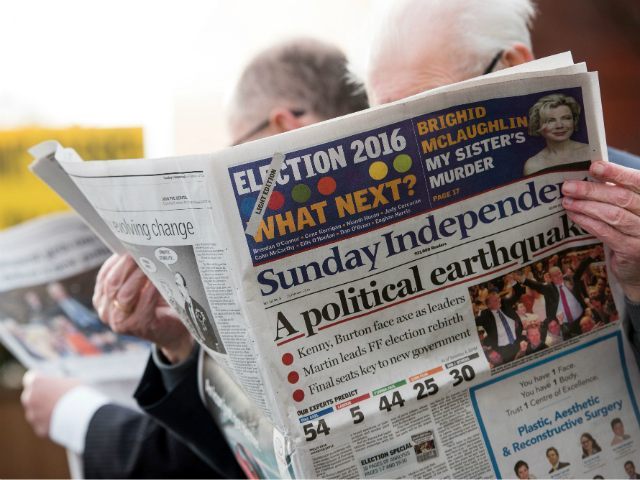Ireland’s two biggest political parties, bitter rivals for almost a century, were facing a tough choice Monday in the wake of inconclusive elections — team up, or risk months of instability.
Fianna Fail and Fine Gael, which between them have ruled Ireland since 1932, differ little in ideology but are instead divided by history dating back to a 1920s civil war following the Irish struggle for independence from Britain.
The question now is whether they can put their old rivalry behind them to provide a stable government for the eurozone’s fastest growing economy and avoid the instability which has rocked other austerity-hit countries like Spain.
Ultimately, the biggest obstacle to a grand alliance may be pride.
“Fianna Fail has still got the psyche of being the natural party of government, of being this dominant party,” said Gail McElroy, political science professor at Trinity College Dublin.
“If you go into government with Fine Gael, you’re essentially giving up on that dream.”
Fianna Fail, whose name means “Warriors of Ireland”, was founded by Eamon de Valera, a towering figure in Irish history who was later president from 1959 to 1973.
The party has its roots in opposition to the 1921 Anglo-Irish Treaty which granted Ireland limited independence from Britain and provided for the partition of Northern Ireland, still part of the United Kingdom.
Fine Gael, meaning “Tribe of the Irish”, grew out of the group that supported that treaty.
Under de Valera’s leadership, Fianna Fail became Ireland’s dominant political force and remained so until 2011, when it suffered a defeat of historic proportions in response to a brutal economic crisis and housing crash on its watch.
The party rebounded in Friday’s election but is far from reclaiming its lost dominance.
Before the election, analysts noted that Fine Gael and Fianna Fail’s combined support was at historic lows — a trend for established parties reflected in many other European countries — and asked whether this could be the vote that finally ended “civil war politics”.
For some, the shift to the left, insurgents and small parties in Friday’s election did just that.
“The Irish people are tired of 100 years of civil war politics and they are saying: ‘Look, let’s do something new,'” said Stephen Donnelly after being elected for the newly-formed party the Social Democrats.
– ‘Will of the people’? –
Any coalition between Fine Gael and Fianna Fail has the potential to transform both parties and also Irish politics.
“The really interesting thing in this election is that ideology may be actually emerging, we may be waking up to 20th century European style politics,” McElroy said.
“There is kind of a left, although it’s quite fragmented, and now there is a centre-right,” she added.
But an alliance between the two would risk angering their old guard and activist base.
Eamon O Cuiv, deputy Fianna Fail leader and de Valera’s grandson, said a deal with Fine Gael would break pre-election promises not to unite and alienate the party’s core supporters and canvassers.
“The people who were doing all of the hard work for the party… they would see us being totally incompatible with Fine Gael policies,” O Cuiv said.
It would also hand a strategic advantage to the left-wing Sinn Fein, which would become Ireland’s main opposition party after gaining support on an anti-austerity platform, a new chapter for the party once seen as the political voice of the Irish Republican Army.
Sinn Fein leaders like to dismiss the two parties as “tweedledum and tweedledee” and its president Gerry Adams urged them to unite following the vote.
“They are natural partners, they are Siamese twins, they should get into bed together,” he said.
An editorial in the Sunday Independent newspaper urged the parties to listen to the “will of the people”.
“It is time for these two parties born of a civil war to live up to the greatness of their past and to prove themselves renewed and worthy of a future of the common good,” it added.

COMMENTS
Please let us know if you're having issues with commenting.